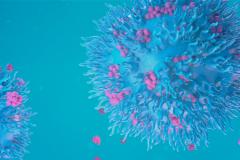
On May 2, BC Children’s Hospital Research Institute (BCCHR) is coming to Salmon Arm, BC, with Mini Science Night — a public lecture that explores the newest discoveries and innovations in health research. Admission is free and everyone in the community is welcome, including students, teachers, parents, seniors, and local health-care professionals. Attendees will learn about careers in science and medicine, hear from award-winning professionals, and connect with community members who have similar interests. There are 50 seats available to the public when registration opens on April 2.
“By moving around BC, Mini Science Night hopes to give students and adults across the province the opportunity to develop their dreams regarding a career in research,” says keynote speaker, Dr. Wyeth Wasserman, Investigator at BCCHR and Professor in the Department of Medical Genetics at the University of British Columbia (UBC).
Leading-edge genomic technologies are transforming the ability to identify the causes of genetic disorders, providing answers to many families across BC. Dr. Wasserman will present on the Silent Genomes Project, a study aimed at reducing health-care disparities affecting Indigenous Peoples by enabling life-changing diagnosis for children with genetic diseases. This research seeks to overcome barriers that Indigenous Peoples face to equitable diagnosis of genetic disorders. “BCCHR serves the interests of youth and their families, and conducts research that promotes awareness and fosters hope,” he says.
The project’s top priorities include ensuring Indigenous-led governance over the biological samples and health data, and working collaboratively with Indigenous partners.
VACCINES
If you’re interested in understanding how vaccines are developed, you may want to secure your registration before all the seats are taken. This topic will be addressed by Emily Mason, PhD student in Dr. Manish Sadarangani’s lab and at the Vaccine Evaluation Center (VEC) at BCCHR. “Mini Science Night offers an exciting opportunity to have discussions with communities beyond the Lower Mainland,” she says. “Public talks about our research help increase transparency and build trust.”
Mason’s current research focuses on pediatric infectious diseases and on developing vaccines for bacterial infections that are becoming more resistant to antibiotics. At Mini Science Night, she will also provide an overview of VEC’s ongoing research projects and highlight opportunities to engage in their studies. The VEC is currently recruiting participants for studies focused on COVID-19, cervical cancer, pneumococcal disease, vaccine concerns, and the use of digital technology in adverse events following immunization. “Attending Mini Science Night is a fantastic way to learn directly from researchers about their work,” Mason says. “Join us and bring your questions!”
MINI MED SCHOOL
On May 3, one day after Mini Science Night, BCCHR will stop in Vernon, BC, to host Mini Med School — a free program for grade 10–12 students looking to explore health science careers. “Not everyone knows about opportunities to participate in or learn about research at BC Children’s Hospital, so we want to provide as many perspectives as we can,” says Dr. Wasserman. “From the prevention of injuries on the water to managing anxiety, you’ll see there’s a breadth of areas where research is making a difference.”




